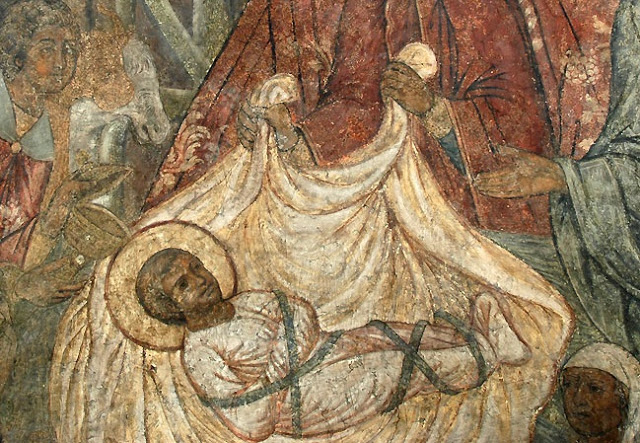
From ‘The Parable of a Robber who was Saved for the Sake of his Few Tears’
Contrition of the spirit and lamentation of the heart is our surest means to assure forgiveness for our sins. Apostle Paul writes, “Godly sorrow brings repentance that leads to salvation and leaves no regret.” (2 Corinthians 7, 10). The biblical king and prophet David teaches, “a broken and contrite heart you, God, will not despise”. Having nothing else with which to redeem our sins before God, let us resort to these more often; we must be sorrowful and contrite, and utterly bewail our infirmity and imperfection in our service of our Lord. Let us cry, for we truly deserve nothing else from Him than wrath and punishment for our misdeeds and we are unworthy of His mercy. Our humility and lamentation of the heart will please our Lord, and He will turn His wrath to mercy.
During the reign of King Maurice there lived a savage and relentless robber in the land of Thracia. Failing to capture him by force, the King resorted to a different weapon – His mercy. He sent him his cross with the message: “Fear not”. This remarkable deed softened the robber’s heart. He repented. He came to the king, fell at his feet, and promised to change his ways. The king pardoned the robber and let him remain in the city. Some time later, he was afflicted by a severe illness and saw in his dream a vision of the judgment day. He woke up and felt the approach of his imminent death. Horrified of his sins, he pleaded fervently for forgiveness. “O Master, King and Lover of Mankind,” he wailed. “Just as you had saved a robber before me, so too accord me Your infinite mercy and hear my lamentations on my deathbed. As you have hearkened to those others who had accomplished nothing worthy at their eleventh hour, so too hear my bitter pleas, cleanse me and wash me with my tears. Seek nothing else from me. Seek and ask not, as you will find nothing good in mе; my sins and iniquities are innumerable and truly immense. But as you have hearkened to the weeping of Apostle Peter, so too turn Your ear to my woeful lamentations and forgive my transgressions with the kiss of your mercy”.
In this manner, he spent many hours bewailing his sins until he finally departed. A doctor who was living nearby saw a dream in which hordes of devils had come to the robber’s deathbed to claim his soul. They held out numerous charts of his sins. Two angels were following them with a scale. The devils put their charts on one cup of the scale. “What shall we put on the other?” cried the angels. “We have nothing – it has been just ten days since his last murder. All we can do is try this handkerchief moistened with the tears that he had wept before his death?” And so they put the handkerchief on their scale. O boundless mercy of our Lord! This one handkerchief outweighed all of the man’s sins. The devils’ charts were blown away. The angels took the soul of the departed man, and the devils left with nothing. So let us remember, brethren, how much it means for us to lament and bewail our sins.
Is this the only example? Certainly not. There are uncountable others. The Lord forgave the sins of a sinful woman, but not before she wetted His feet with her tears and wiped them with her hair. The publican walked home from the temple justified before God, but only after he had stood there at a distance. He was not looking up to heaven but beating his breast saying, “God have mercy on me, a sinner”. Apostle Peter, who had renounced Christ three times, was pardoned when he repented his sin with all his heart. David was forgiven for his grave sins of adultery and murder, after spending many nights crying over them in his bed. Let us, too, shed our tears over our innumerable sins so the Lord would see our repentance, and let us back into His fold, like the proverbial Father who welcomed back his prodigal son. May the Lord forgive us like He forgave the robber who cried from the Cross with all his heart, “Jesus, remember me when you come into your kingdom”. Amen.
Translated by The Catalogue of Good Deeds
Source: https://azbyka.ru/otechnik/Viktor_Gurev/prolog-v-pouchenijah-na-kazhdyj-den-goda/49




